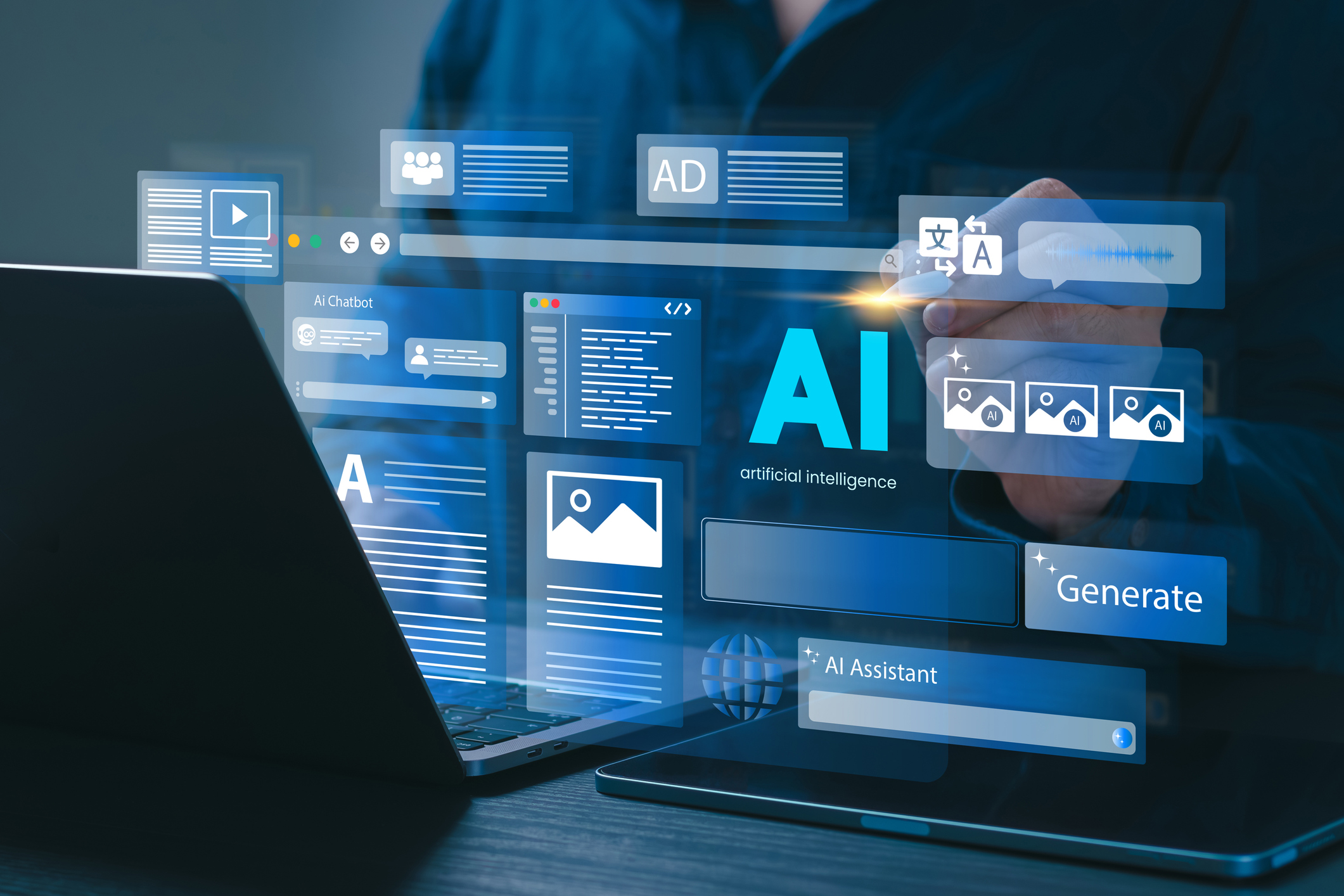Leadership and Organizational Development
Opportunities and Risks for Implementing AI in Human Services
While the social sector was initially slower to adopt artificial intelligence (AI) than the private sector, they are quickly catching up. Now, 58% of nonprofit organizations say they are testing use cases for AI. Facing budget constraints and staffing shortages, many organizations can leverage AI tools to effectively bridge these gaps. AI can be useful across many organizational functions, including human resources, data and quality improvement, IT, and marketing, but some employees may feel hesitant to use it.
Understandably, there is a clear tension between the anxiety around AI and the promise that it can automate processes and improve efficiency.
Opportunities
Below are four key considerations as organizations develop a human-centric approach to AI implementation, allay workplace anxiety, and empower employees to take ownership of new tools:
- Build Trust through Transparency and Communication: Organizations that are open and transparent about their AI adoption plans, including how AI will impact roles and what training opportunities will be provided, can significantly reduce employee anxiety. Involving employees in the AI adoption process can also build trust and a sense of ownership. Consider creating a cross-functional AI-readiness team involving employees from all levels in the organization.
- Use AI As an Assistant, not a Replacement: When framing AI initiatives, focus on the tasks they can support and emphasize that they are not supplanting any one job or position. Repetitive, data-intensive, and predictable tasks are prime candidates for AI. When AI takes over these monotonous aspects of a job, it can free employees to focus on more creative, strategic, and human-centric work. This can boost job satisfaction and reduce burnout.
- Don’t Underestimate the Importance of Upskilling and Training: This step is crucial for mitigating job anxiety. Organizations implementing AI-driven initiatives have a responsibility to invest in training programs that equip employees with the skills needed to work alongside AI, manage AI systems, or transition into new AI-augmented roles. This includes both technical skills related to AI literacy and human skills like creativity and emotional intelligence.
- Implement AI Ethically and Create Contingency Plans: Concerns about bias, privacy, and the dehumanization of work are valid. Implementing AI ethically, with robust governance frameworks and human oversight, is essential to build trust and ensure AI serves humanity, not the other way around.
Risks
For all the benefits of AI, there are many risks as well. AI can magnify human biases, open the door to data breaches, put client privacy at risk, and just be completely inaccurate. According to the recent State of the Nonprofit Sector Report, 42% of organizations are concerned about these dangers. Another finding related to workplace morale is that employees who used generative AI frequently lost intrinsic motivation and experienced more disengagement at work than those with little-to-moderate use.
Nonprofits need to carefully consider the risks accompanying AI and document them as part of their risk-management strategy. Mitigation plans should include rapid responses to cybersecurity threats and data breaches; strategies for protecting client data and privacy; and comprehensive AI training for all employee, including how it works, how to check for inaccuracies and plagiarism, and appropriate use cases.
Despite the risks, less than 25% of social sector organizations have a clear strategy or policy for AI use. AI integration will continue to grow and now is the time to draft your organizational approach. Ask your teams to share their hopes, fears, and questions about AI. Draft processes and boundaries that keep personally identifiable information secure and out of generative AI systems. Upskill your team with AI courses, research, and workshops to better understand algorithmic bias and how to identify and mitigate bias risks.
Some sample templates for drafting your own AI use policies include:
- AI Policy Template: Acceptable Use of Generative AI Tools (2023) Thrive
- AI Policy Template: Build Your Organizational AI Policy (2024) Responsible AI Institute
Also explore these guiding frameworks for ethical and impactful AI adoption:
- Artificial Intelligence Risk Management Framework from NIST, U.S. Dept of Commerce
- Responsible AI Adoption in Philanthropy: An Initial Framework for Grantmakers from Project Evident
Conclusion
As artificial intelligence continues its rapid integration into all sectors, nonprofits stand at a crucial juncture. The opportunities for enhanced efficiency, expanded reach, and improved service delivery are immense. However, these advancements are not without complexities, and AI must be implemented thoughtfully with employees at the center. By fostering open dialogue, prioritizing staff empowerment, and investing in comprehensive AI literacy, nonprofits can ensure AI serves as a powerful force for good within their organizations and beyond.
Sources & Further Reading
Articles
- Does AI Take the Human Touch Out of Human Services? (2024) Social Current
- Real Talk on Artificial Intelligence: To Unlock the Potential of AI, Nonprofits Must First Know the Risk (2024) BusinessWest
- Gen AI Makes People More Productive – and Less Motivated (2025) Harvard Business Review
- Mapping the Landscape of AI Powered Nonprofits (2024) Stanford Social Innovation Review
- For AI Adoption Success, Focus on These Five Critical Value Drivers (2024) Forbes
- What Nonprofits Can Learn from the AI Hype Cycle (2025) Talking AI Substack
- Social Work Research in the Age of Artificial Intelligence (2023) Families in Society the Journal of Contemporary Social Services, 104 (Issue 4), 407-409
Reports
- 2025 State of the Nonprofit Sector (2025) Forvis Mazars
- The State of AI in Nonprofits Benchmark Report (2025) Tech Soup
- The AI Equity Project (2024) Sponsored by Giving Compass
- Grassroots and Nonprofit Perspectives on Generative AI (2024) JRF
Knowledge and Insights Center Resources
Social Current’s Knowledge and Insights Center (KIC) offers leaders expertly curated resources to stay ahead of sector trends, implement innovative strategies, and develop your skills to ensure you’re on the cutting edge of best (and next) practices.
Learning Community
Enhance your leadership skills through a range of professional development and learning opportunities. The KIC offers live webinars, self-paced courses, trainings, and learning cohorts.
Center for Creative Leadership Series: Lead the future of your organization and unlock your full potential with on-demand courses from the Center for Creative Leadership.
Next Big Idea Book Club (Impact Partner Exclusive): This book club features nonfiction titles curated by bestselling authors Malcolm Gladwell, Adam Grant, Susan Cain, and Daniel Pink. Through each concise, high-impact course, participants can gain a deep understanding of key concepts and practices in less than 45 minutes.
Business, Media, & Research Databases
From thousands of premium journals to the latest social sector news and media, Social Current Impact Partners and KIC subscribers have access to a wealth of evidence-based resources to support them in addressing any leadership challenge.
Business Books Summaries. Want to learn from bestselling business authors, but don’t have time to read everything on your list? Business Book Summaries provides concise overviews of thousands of key business books to help stay current and develop new skills.
Top Business Book Summaries on AI Technology:
- Generative AI: Navigating the Course to the Artificial General Intelligence Future (2025) Martin Musiol
- The CEO’s Digital Survival Guide (2025) Nathan Wittacre
- AI-Driven Project Management (2025) Kristian Bainey
- Generative AI: Insights You Need from Harvard Business Review (2024) Harvard Business Review
- AI-Savvy Leader (2024) David De Cremer
The Tech-Informed Leader’s Recommended Reading List:
- Welcome to AI: A Human Guide to Artificial Intelligence (2025) David L. Shier
- Unmasking AI: My Mission to Protect What Is Human in a World of Machines (2024) Joy Buolamwini
- You Look Like a Thing and I Love You: How Artificial Intelligence Works and Why Its Making the World a Weirder Place (2019) Janelle Shane
- Co-Intelligence: Living and Working with AI (2024) Ethan Mollick
- Human + Machine: Reimagining Work in the Age of AI (2024) Paul R. Daugherty & James Wilson
Social Current Resources and Opportunities
Customizable Consulting: As artificial intelligence reshapes the social sector, leaders have a critical role to play in guiding their organizations through this technological transformation with vision, transparency, and humanity. Social Current has deep expertise in leadership and organizational development in the social sector. We can partner with you to assess and enhance your leadership strategies and provide training for teams.
SPARK 2025: At SPARK 2025, chief executives (CEOs and executive directors) will have a unique opportunity to deepen their understanding of how to lead through this change with the workshop, A1: AI Is Here—Now What? How CEOs Are Leading with Generative Intelligence. This session will feature candid insights from Brightpoint, a Social Current network organization, and Truth Collective, which has supported marketing and branding initiatives for Social Current and Brightpoint. Participants will explore applications and leadership-level implications for integrating AI into mission-driven work.



